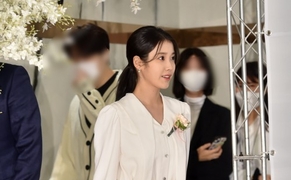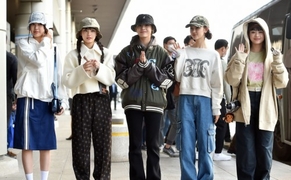CASA RICORDI IN PRESENT DAY
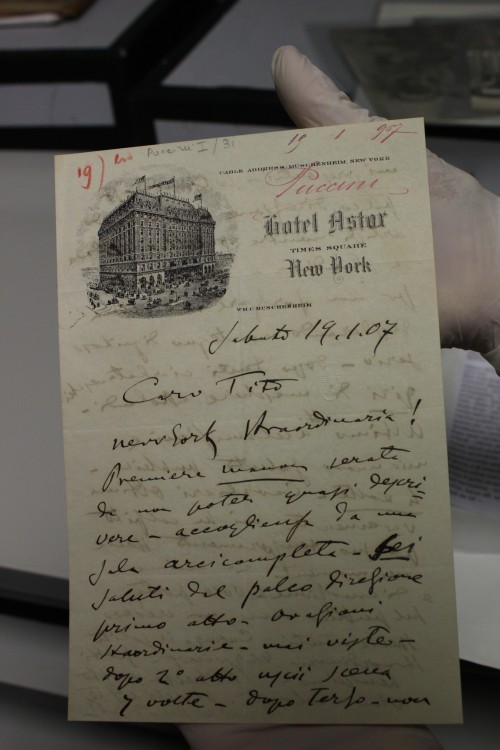 |
| A Letter from Puccini to Giulio Ricordi from New York./ Photo by Sohn Soo Yeon |
The great success Casa Ricordi had in preserving the invaluable collections and opera-related documents despite the dangers incurred by World War II can be best explained by the efforts made by the Ricordi family and its professional management team. In 1918, the publishing house that had been entirely family-run for over 111 years outsourced its management.
The successful partnership between the Ricordi family and professional executives provided the company the necessary stability to maintain its legacy as a music publishing house. When the war worsened, the management moved the publishing house’s archives to a safer location. Although the bombing of Milan destroyed two of the company’s headquarters, the company avoided the utter destruction of some of opera’s most historical assets.
Following Puccini’s death, the influence of Italian opera began to fade. By no means was this unique to Italy; as mentioned before, much of Europe’s cultural achievements suffered a critical blow from the two world wars. In addition, the rise of new forms of entertainment like musicals and movies gradually solidified the notion that opera was a remnant of days past.
Despite these challenges, Casa Ricordi revived Italian opera and closely studied celebrated Italian operas such as those by Rossini and Verdi (Maria Callas’ performance of Luigi Cherubini’s opera Medea is a piece that Casa Ricordi recovered). The publishing house also devoted much effort to sponsoring contemporary opera composers. Of course, it continued to preserve all of Italian opera’s priceless collections in its archive.
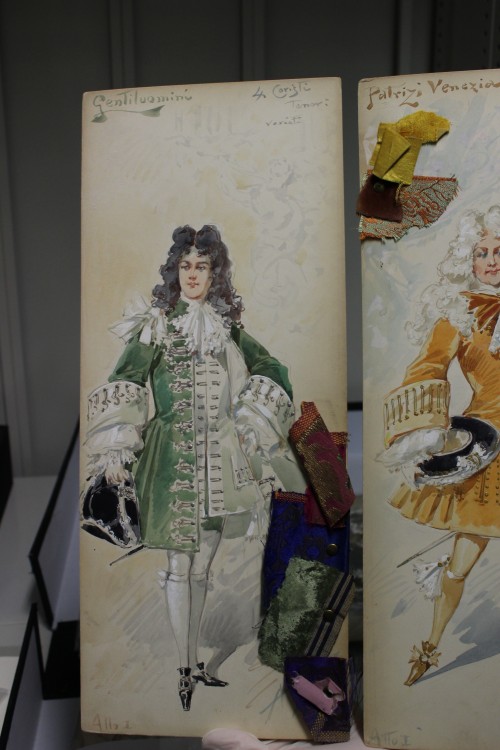 |
| A sketch of the costumes for the 1800s and a sample of fabric/ Photo by Sohn Soo Yeon |
1994 is another significant year in Casa Ricordi’s history, as it gets acquired by the German media company Bertelsmann. Although the record publishing rights of the company was later sold to the French company Vivendi’s subsidiary Universal Publishing Music Group, the archive continues to be owned by Bertelsmann. Since then, Bertelsmann has valued the cultural assets of the Ricordi Archive very highly and has continued to put in considerable effort in preserving it. The primary focus currently lies on digitalizing the existing files, as it minimizes the risk of damaging the original sources while maximizing the potential to spread awareness of the archive.
The digitalization of the Ricordi Archive began in 2006 with the unilateral agreement and support of the Italian Ministry of Culture, the National Department of Archives and Libraries, the general supervisory council for libraries and cultural institutions, and of course, Casa Ricordi. Due to the collaboration of these various institutions, 135,000 digital catalogues have been published since.
The rich primary sources available through the digital archives allowed for 19th and 20th century scholars to not only further develop the music publishing industry, but also to research the most distinguished operas with depth. What makes this archive even more extraordinary is its massive iconographic collection (records of the pictorial, scenographic and decorative arts) in addition to music, allowing one to piece together the diverse elements of Italian culture, economy and society.
Today, the Ricordi Archive lives inside the National Braidense Library in Milan as a private museum not available to the public. However, it continues provide research done on digitized archive for educational purposes, and it strives to maintain its high standards on preservation.
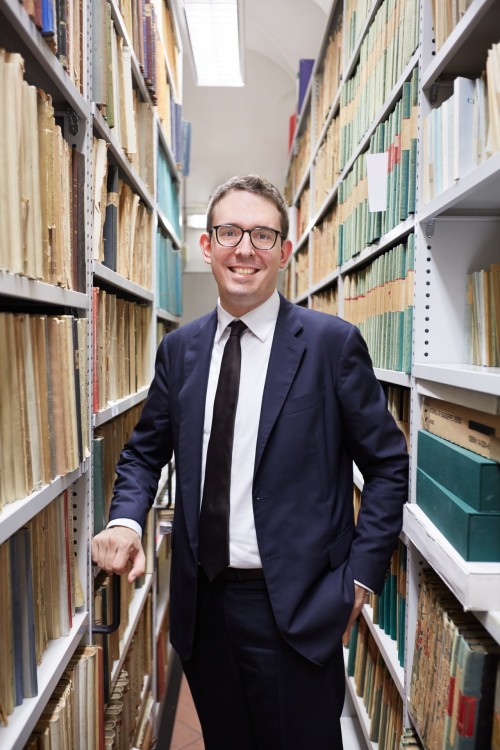 |
| The director of Ricordi Arcaive Pierluigi Ledda |
Through an exclusive interview with Pieluigi Ledda, the Director of the Ricordi Archive, I was able to learn more about this extraordinary archive’s past and current state.
The Archivio Storico Ricordi was established and maintained by the Ricordi music publishing house, founded in 1808, and grew along with the company. Considered as one of the world’s most important privately owned musical archives, it preserves the original handwritten scores of 23 of Giuseppe Verdi’s 28 operas, all the operas composed by Giacomo Puccini (except La Rondine), as well as a great many works by composers like Vincenzo Bellini, Gioachino Rossini and Gaetano Donizetti and their contemporaries including Luigi Nono, Franco Donatoni, Salvatore Sciarrino and Sylvano Bussotti.
The Archive, housed in the Braidense Library in Milan, preserves almost 8,000 original scores, more than 16,000 letters by musicians, librettists, singers and other professionals connected to these arts, roughly 10,000 costume and set designs, around 10,000 libretti, 6,000 historical photographs, and a large collection of Art Nouveau and Art Deco posters created by some of the principal artists of the time.
Q: What is the special legacy of Italian opera that currently resides in the Ricordi Archive?
The extraordinary importance of the Archive lies in the variety of documents it preserves. They offer a panoramic vision of culture, industry and society over the course of two centuries of Italian history. The Archive has a rich iconographic collection chronicling numerous opera premières, and includes set and costume designs, collections of photographs and letters, as well as a large volume of business documentation, all of which enable scholars to reconstruct the genesis of major opera masterpieces and the development of the musical publishing industry in the 19th and early 20th century.
Q: What is the value of the Ricordi Archive in connection with Italian opera?
The Archivio is essential for understanding the development and global success of Italian opera. The iconography section of the Archive, for example, which is now fully accessible through our website digital.archivioricordi.com, offers important information related not only strictly to musical activity, but also to the pictorial,scenographic and decorative arts (such as the history of costume design, jewelry design and stage props), the publishing company itself (reconstructing the relationship between the publisher and various artists, whether they be musicians, librettists or visual artists), and the world of theatre.
Q: How do you think having such valuable assets impacts the development of opera and culture in general?
The Ricordi Archive has been owned by the international media company Bertelsmann since 1994. As an important part of Italy’s national cultural heritage, it also enjoys special protection by the Italian cultural authorities. Bertelsmann, which itself has a long tradition as a creative company, works with the Ricordi team in Milan to safeguard the archive's stocks for posterity through continual restoration and digitization. The idea is to develop the Archivio Storico Ricordi into an international best-practice case in the field of communicating cultural and historical archive material in the digital era, and to make its resources accessible both to the academic community and to a wider audience. It is important to keep such cultural treasures alive, because they still have an enormous appeal and inspire people all over the world to this day.
Translation. Betty Heeso Kim
|
Most Read
-
1
-
2
-
3
-
4
-
5
-
6
-
7




















